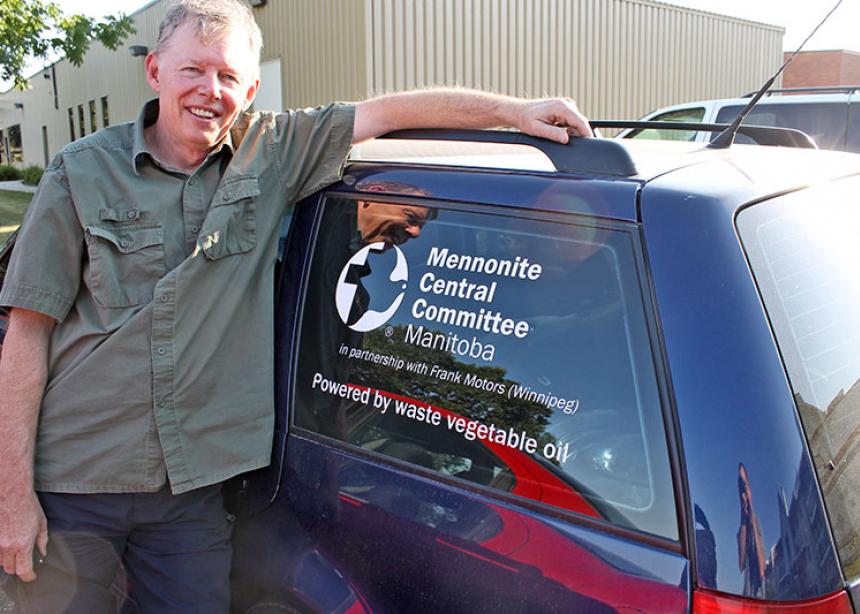When Ken Rempel stopped for a construction delay on Highway 2 near Winnipeg, the flagman asked if he was the guy who ran his car on vegetable oil. The flagman had confused Rempel with another Highway 2 commuter, but just the same, Rempel’s interest was piqued.
Three days later, he spent a few thousand dollars to get his car converted to burn waste vegetable oil (WVO). His wife’s car was next. In the five years since then, the Elm Creek couple has driven over a half-million kilometres, combined, on deep-fryer leftovers.
Coincidently, the driver for whom the flagman mistook Rempel, was Brad Reimer, who commutes down the same highway from Fannystelle to the Mennonite Central Committee (MCC) Manitoba office in Winnipeg. He drives MCC Manitoba’s WVO-powered VW.
The car was relatively new to MCC at the time. Reimer, who serves as director of communications and donor relations, says MCC was needing a new vehicle and “wanted to do something different,” to “make a statement” about care for the environment.
After researching options, MCC decided on a diesel Jetta wagon and a partnership with Frank Motors, a Winnipeg business that installs vegetable-oil conversion kits. MCC got the work done for free. MCC purchases filtered WVO which Frank Motors sells for $0.76 per litre. The oil comes from restaurants.
Most people with WVO cars, like Rempel, collect and filter their own oil.
The conversion kit involves a second fuel tank and fuel line, one or two heating devices to warm up the oil before it enters the engine, and a means to switch the fuel source from diesel to veggie oil. Nothing in the actual engine is altered.
Generally, the car needs to run on diesel until the engine and the oil warm up, at which point a manual or automated switch changes fuel sources. About 30 seconds before shutting off the engine, the system must be purged or back-flushed to clear out the oil prior to the next start up.
“Overall, we’ve been happy with it,” Reimer says of the system.
MCC has included the car in its display at rural Manitoba fairs in recent years, wanting to show people that WVO is a viable alternative to fossil fuels. Reimer says the idea has been “very, very well received.”
A lot of people had heard of it, but had never seen it. While Reimer knows of only a handful of converts as a result of the MCC car, he says dozens have considered it seriously.
The main drawback, he says, is convenience. Collecting and filtering your own oil, or even getting it from a lone source, as MCC does, is not as easy as pulling into the nearest service station. In addition to initial set-up costs, there are also added maintenance costs, most notably regular fuel filter changes.
Rempel, who is a member of Elm Creek Mennonite Brethren Church and works in seniors housing development, used to try to convince his friends to make the switch, but doesn’t any more, saying it’s not for everyone. “You’ve got to have a passion for it,” he says, noting that it makes most sense for people who put on a lot of highway miles and have the time and inclination to gather and filter oil.
Rempel’s interest in WVO comes both from the financial savings—he pays no more than 25 cents per litre—and environmental thriftiness. “I am proud of the fact that I’m using something that quite often goes to the landfill,” he says.
Statistics related to use of vegetable oil for fuel are hard to find other than rough estimates that suggest if all WVO were used, it would account for up to 2 percent of total energy needs in North America.
It’s fair to say the technology—which actually dates back to the original diesel engine, which ran on peanut oil—is not catching on quickly. Perhaps because car culture, at its core, is about convenience.
That said, Ken Rempel and Brad Reimer have no plans of switching back to conventional fuel.




Comments
Hey, I'm curious to hear more about your wvo set up. My father and myself as well as two friends had converted our trucks and a van to run on wvo a few years back. We drive mostly Dodge Cummins trucks for work / camper hauling and actually filter our oil enough that we've had longer intervals in between oil changes. Maybe we can share some intel and learn from each other's systems.
Add new comment
Canadian Mennonite invites comments and encourages constructive discussion about our content. Actual full names (first and last) are required. Comments are moderated and may be edited. They will not appear online until approved and will be posted during business hours. Some comments may be reproduced in print.